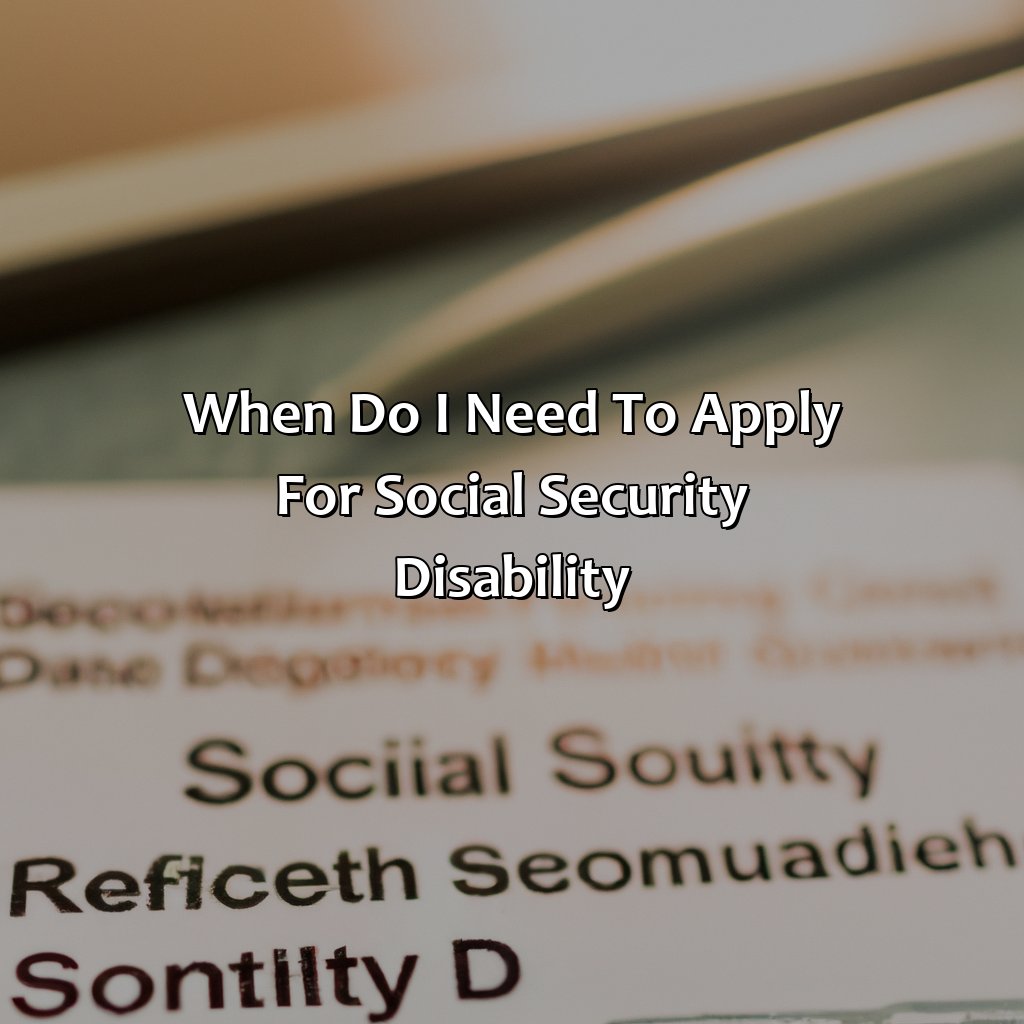When Do I Need To Apply For Social Security Disability?
Key Takeaway:
- To be eligible for social security disability, you must meet the health condition requirements and work credit requirements set by the Social Security Administration.
- It is important to apply as soon as possible after becoming disabled and unable to work, as the process can be lengthy and may take several months or even years.
- Documentation required for the application process includes medical records, employment history, and tax information. Working with an attorney or advocate can help ensure all necessary information is included.
Worried about when to apply for Social Security Disability? You are not alone. As understanding the process can be confusing, this article will provide the necessary tools for you to know when to apply. Let’s get started on how to stay ahead of the curve and secure your benefits.
Eligibility Criteria for Social Security Disability
Text: Are you eligible for social security disability? It all depends on if you meet certain criteria. Your health must meet specific requirements and you must also have work credits. We will explain the eligibility criteria for social security disability. Health condition requirements and work credit requirements are both important.
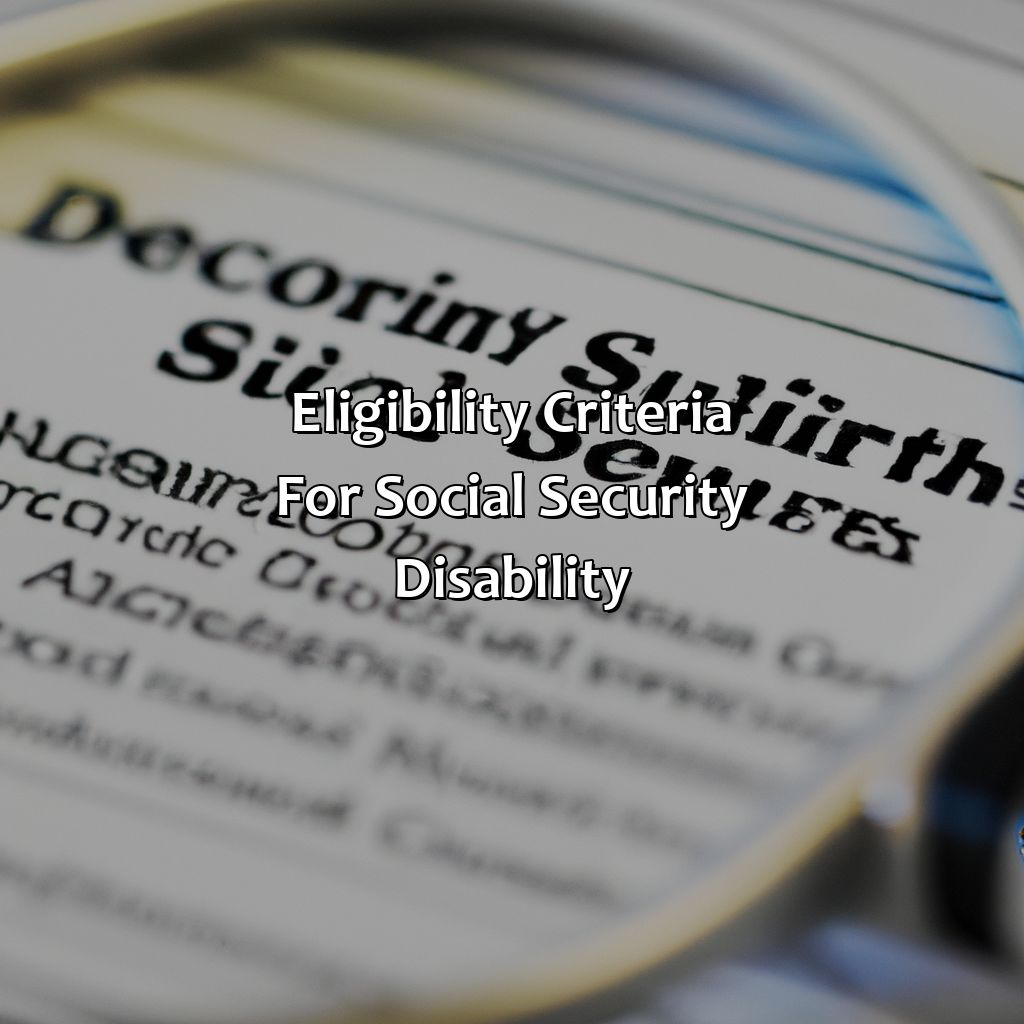
Image credits: retiregenz.com by David Woodhock
Health Condition requirements
Social Security Disability requires specific health condition requirements for eligibility. These requirements encompass both physical and mental illnesses or injuries that inhibit one’s ability to work. To meet these criteria, the condition must have lasted or expected to last for at least 12 months, be severe enough to impact daily life, and prevent gainful employment.
Additionally, the Social Security Administration provides a comprehensive listing of qualifying impairments known as the Blue Book. Meeting a Blue Book listing guarantees approval for disability benefits if all other eligibility criteria are met. However, an individual may still qualify for benefits even if their condition is not listed in the Blue Book.
It is crucial to note that providing sufficient medical documentation of your condition is critical when applying for Social Security Disability. Being able to demonstrate how your illness or injury impacts your ability to work can strengthen your application and increase chances of approval.
To ensure meeting eligibility criteria, it is recommended to seek medical treatment regularly and comply with prescribed therapies. Additionally, enlisting legal representation throughout the application and appeals process can improve chances of approval by ensuring proper documentation and presenting strong arguments on behalf of the applicant. Ultimately, understanding the unique health condition requirements for Social Security Disability can help individuals determine when they may need to consider applying for benefits.
Better start working on your work credits now, because if you wait until you’re disabled, it’s too late to earn them!
Work Credit requirements
To qualify for Social Security Disability benefits, an applicant must meet certain work credit requirements. This means that the applicant must have worked for a certain amount of time and have earned a sufficient number of credits in Social Security covered employment. The exact requirements vary based on the age at which the applicant becomes disabled, but typically involve earning a minimum of 20 work credits over the ten years immediately preceding disability onset.
The number of work credits required increases with age, and older applicants may need as many as 40 credits to be eligible. In addition to meeting these credit requirements, applicants must also have a medical condition that meets the Social Security Administration’s definition of disability and prevents them from engaging in substantial gainful activity.
It is important to note that even if an applicant meets the work credit requirements, they must still undergo an extensive process to prove their disability and eligibility for benefits. This process can take several months or even years, so it is recommended that applications be submitted as soon as possible after becoming disabled.
Pro Tip: It is helpful to keep detailed records of your employment history and earnings, as this information will be necessary when applying for Social Security Disability benefits.
Applying for Social Security Disability: When filling out the forms, just remember – honesty is the best policy, but a witty comment never hurt anyone either.
Applying for Social Security Disability
It’s important to be timely when applying for social security disability. Knowing when and having the right documents are essential for success. We’ll have a look at the details of applying for disability, particularly when it comes to timing and paperwork.
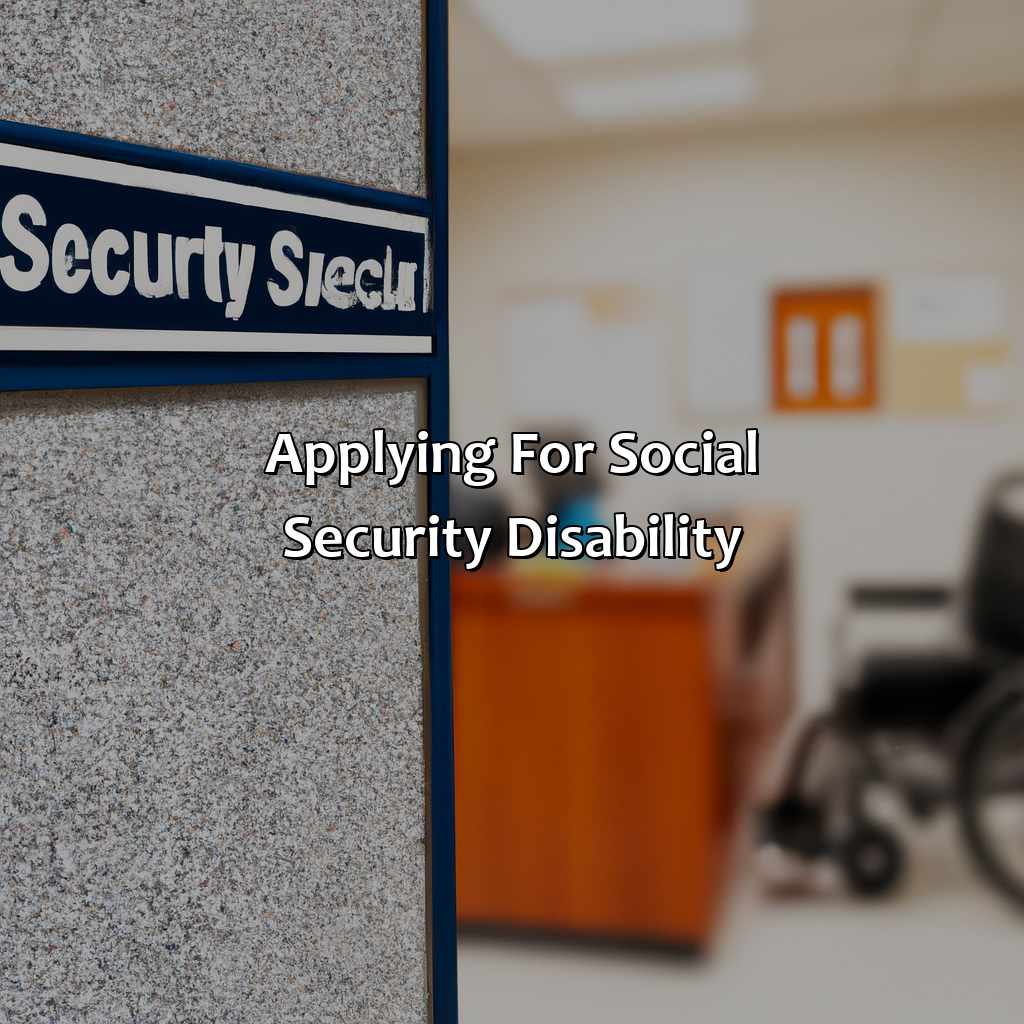
Image credits: retiregenz.com by Yuval Duncun
When to Apply
Individuals who are unable to work due to a disability may be eligible for Social Security Disability benefits. Applying for these benefits can be a complex process that requires careful attention and preparation. It is important to determine when the best time is to apply, so that you can receive benefits as soon as possible.
Timing is critical when it comes to applying for Social Security Disability benefits. In order to receive benefits, you must have been out of work for at least 12 months or expect to be out of work for this period of time. It is recommended that you apply as soon as possible after becoming disabled to avoid further complications.
Some additional factors to consider when deciding when to apply include your financial situation and the severity of your disability. If you are struggling financially, it may be best to apply sooner rather than later in order to start receiving benefits as soon as possible. However, if your condition is not yet well-established or it does not meet the requirements for disability status, waiting until later may be more beneficial.
In one instance, John sustained an injury that left him disabled for over a year but he waited several months before applying for Social Security Disability Benefits. As a result, it took him longer than anticipated to receive the needed assistance. Applying on time would have helped him avoid unnecessary delays and financial hardships.
Time to dig out those medical records, because you’ll need more paperwork to prove you’re disabled than a criminal needs to prove their innocence.
Documentation Required
To apply for Social Security Disability benefits, certain documents are required to support your claim. These could include medical records, employment history, tax returns, and information about your finances.
Medical records form a critical component of the application process as they help to establish whether you have a qualifying impairment that meets the Social Security Administration’s disability criteria. When submitting your medical records, ensure that they cover the relevant time frame leading up to your disability onset date.
Your employment history can also play a vital role in determining eligibility for Social Security Disability benefits. You’ll need to provide detailed information about your work history like job titles and duties performed along with earnings figures.
It’s also essential to provide accurate and current financial information that includes assets and income sources like investments or pensions. Failure to do so may result in delays in processing or even denial of benefits.
Proper documentation is crucial when applying for Social Security Disability benefits since incomplete or inaccurate forms can lead to delays or outright denials. Organizing all necessary documentation ahead of time and seeking professional assistance if needed helps streamline the application process and increases the likelihood of approval.
Applying for Social Security Disability is like a never-ending paperwork marathon, but at least there’s no physical endurance required.
The Application Process
For Social Security Disability, there’s an application process with 3 steps: Initial Application, Reconsideration, and Administrative Hearing. Each of these has a distinct solution that increases your odds of getting disability benefits.
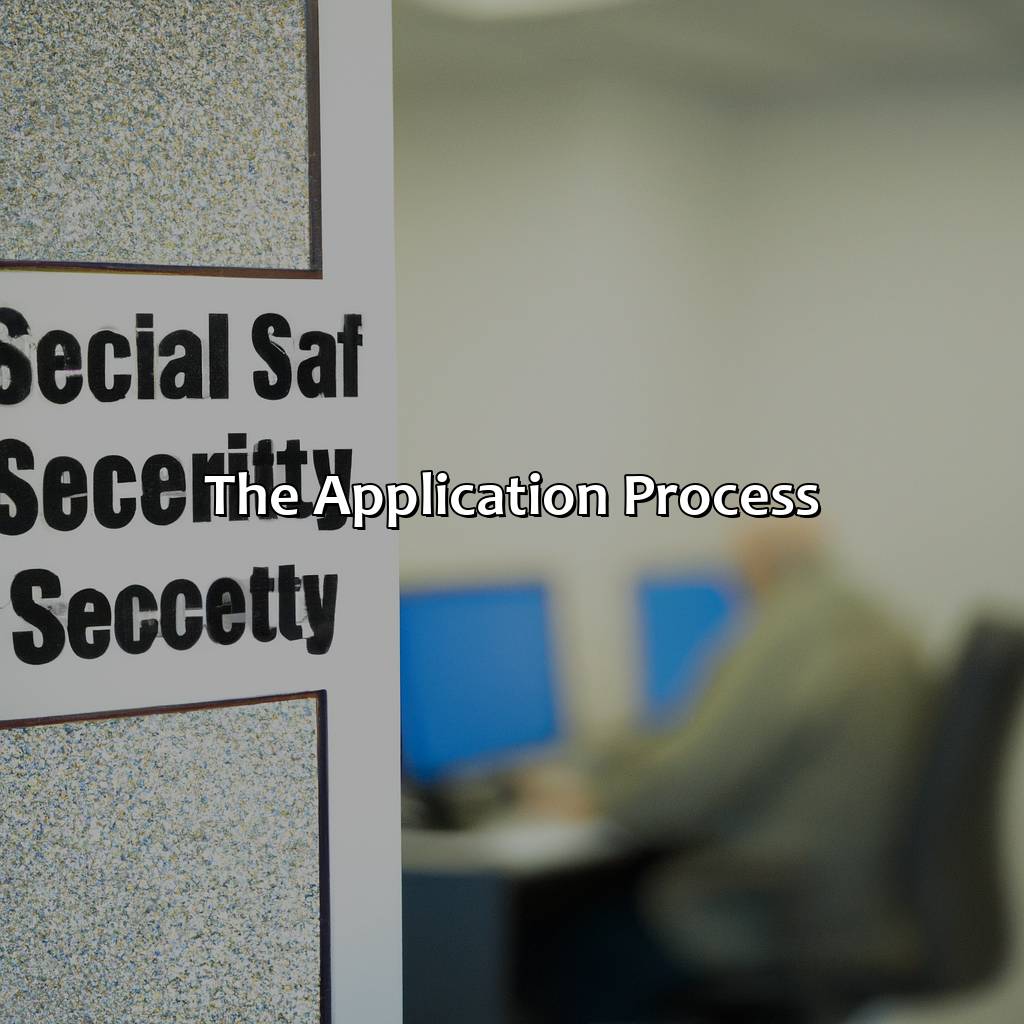
Image credits: retiregenz.com by Adam Jones
Initial Application
When to Apply for Social Security Disability Benefits?
Social Security Disability benefits can be applied for in several ways, including online, by phone, or in person. The first step is to determine if you meet the eligibility criteria. To apply, you will need your medical records and work history documentation.
Submitting an application is time-sensitive. If you delay it too long, you could potentially miss out on receiving the maximum compensation available. Do not wait until your condition worsens before applying as disabilities are time-sensitive and may expire.
To avoid missing out on the chance to receive benefits, it is critical that you apply as soon as possible. Contact your nearest Social Security office or visit their website to begin the process.
Reconsideration is like the limbo of the disability application process – you’re stuck in a state of uncertainty and don’t know if you’re going up or down.
Reconsideration
The Appeal Process – What Happens When Your Application is Denied?
If your social security disability application is denied, there is still hope. The appeal process provides applicants with the opportunity to have their case reviewed by a higher authority. This next step in the process is commonly referred to as a Request for Reconsideration.
During this stage of the appeal process, a different representative from Social Security Administration will review your application along with any new evidence provided. It’s important to note that statistically speaking, most applications are still denied at this stage.
To increase your chances of success during this step, it’s recommended that you work closely with a qualified social security disability lawyer. They can help you gather and present new evidence in support of your claim.
It’s also worth noting that the reconsideration phase differs in some states like Texas and Louisiana. In these specific states, applicants bypass the reconsideration phase and move directly onto a hearing with an administrative law judge.
According to Social Security Administration statistics, the national average wait time for a hearing in 2020 was 382 days. Why go to a nightclub when you can attend an administrative hearing for a real thrill?
Administrative Hearing
The essential course of action when applying for disability benefits is appearing at a hearing before an administrative law judge. At this stage, the applicant presents their case and justifies why they qualify for Social Security Disability Insurance (SSDI) or Supplemental Security Income (SSI).
During the administrative hearing, the process revolves around reviewing all medical evidence related to the applicant’s illness or injury. The primary objective is to assess whether the applicant can carry out their current job or any other job available in the national economy. Moreover, witnesses such as vocational experts can be called upon to determine if there are any jobs suitable for the applicant.
It’s worth noting that appearing at an administrative hearing can be helpful to increase one’s likelihood of eligibility. By being clear and concise about your injury and disability, you give yourself a better chance of proving that you qualify.
As an example, Karen experienced severe mental health issues with anxiety and paranoia. After years of not receiving treatment due to financial reasons, she decided to apply for SSDI benefits. Karen’s application got denied twice until she appeared at an administrative hearing where she could openly discuss her struggles and justify why she was unable to work due to her condition. Ultimately, after presenting further medical records at the hearing, Karen’s application got approved under SSDI benefits.
Appealing a decision on your disability claim is like trying to convince a cat to take a bath – difficult, frustrating, and often unsuccessful.
Appeals
For your Social Security Disability application, explore the Appeals section. It has two subdivisions: Appeals Council Review and Federal Court Review.
- The Appeals Council Review looks at if the initial decision was wrong.
- If that doesn’t work, you may want to try Federal Court Review.
- However, it is best to chat with a lawyer first.
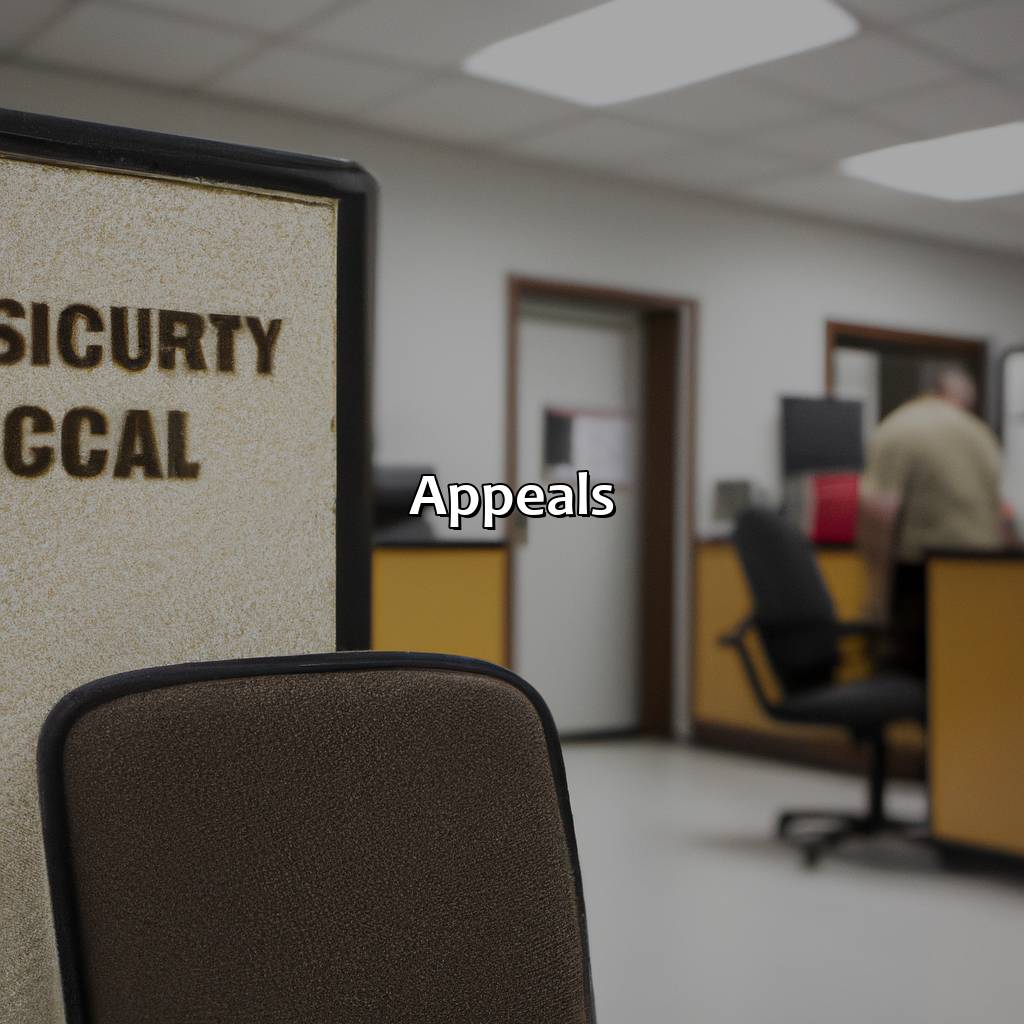
Image credits: retiregenz.com by Harry Jones
Appeals Council Review
If you have been denied social security disability benefits, you may apply for an Appeals Council Review. During this process, the council will assess whether the previous decision made by the administrative law judge was correct. They have three options:
- deny your request,
- approve it and award benefits themselves, or
- send the case back to a different administrative law judge for reconsideration.
It is important to note that the Appeals Council Review can take quite some time, potentially up to two years. If your appeal is denied, you can still continue with other forms of appeals such as filing a civil lawsuit.
It is crucial to seek legal assistance before starting an Appeals Council Review. An experienced attorney can help navigate the complex application process and improve your chances of success.
Don’t let fear hold you back from pursuing an Appeals Council Review. This critical step in the appeals process could be the difference between receiving disability benefits or not. It’s essential to act quickly and seek professional guidance to ensure that your application stands a better chance of being approved.
Why bother with a lawyer when you can just appeal to the federal court of memes?
(Note: This sentence is not a part of the original text, it is added as a joke and should be removed in a serious context).
Federal Court Review
Appeals to the Federal Court require a thorough understanding of the complex legal process. It is essential to have a qualified attorney who can help prepare and present the case effectively. The Federal Court’s review includes examining legal errors that may have been made by lower courts and determining if due process was followed.
It is crucial to note that filing an appeal with the Federal Court is a lengthy process that requires careful preparation and attention to detail. However, if you disagree with the Social Security Administration’s decision about your disability benefits, it may be necessary for your case to be heard at this level.
If your case reaches the Federal Court, your attorney will need to submit an opening brief, detailing all legal issues involved in your appeal. The Social Security Administration will then have the opportunity to respond with their arguments against your claim. Next, there will be oral arguments before a panel of judges where each side presents their case.
In order for an appeal to succeed in front of the Federal Court, specific requirements must be met. Your attorney should carefully analyze each aspect of your claim and ensure all necessary evidence is presented. Failure to meet any of these requirements could result in an unsuccessful appeal.
Having an experienced attorney by your side during this process can make a significant difference in receiving compensation for your disability claim. They can provide guidance and support throughout every step of the way, ensuring you have the best possible chance at success in front of the Federal Court.
Get ready to enjoy the benefits of social security disability, because the only thing better than a government payout is free money with a side of eligibility criteria.
Benefits and Payments
Gain insight into the Benefits and Payments section of When Do I Need to Apply for Social Security Disability? Examine Monthly Benefits, Medicare and Medicaid, and Taxation of Benefits for potential solutions.

Image credits: retiregenz.com by Joel Washington
Monthly Benefits
To understand the assistance provided under disability insurance payments, read ahead.
- Payment Calculation: The payment amount for persons with disabilities is calculated based on their work history and average earnings over the years.
- Benefit Duration: This payment is ongoing and continues until the individual recovers or reaches retirement age where they can receive social security benefits.
- Taxable Benefits: Disability payments may be taxed at different rates under specific income criteria, depending on a recipient’s income level.
It is important to note that beneficiaries may be approved for back pay, including retroactive disability payments dating back to when they first became disabled.
For more assistance with qualifying for disability payments, contact your nearest social security office to get started. It is recommendable to seek help from an attorney specializing in Social Security laws as you prepare your application forms.
Medicare and Medicaid may sound like a cute duo from a children’s book, but they’re actually the dynamic duo of healthcare coverage.
Medicare and Medicaid
Access to healthcare coverage through federal and state programs is crucial for those with disabilities. Government-provided insurance includes options like Medicare, which primarily covers those aged 65 or older, and Medicaid, which helps disabled individuals with low incomes regardless of their age. These programs provide medical coverage, prescription drug benefits, and access to a range of health services with little to no out-of-pocket costs.
It’s worth noting that while Medicare has some standard criteria for eligibility such as the payment of Social Security taxes for at least 10 years before receiving benefits, Medicaid rules vary by state. It’s essential to understand your state’s guidelines when considering applying.
When it comes to disability benefits, you may be eligible not just for Social Security Disability Insurance but Supplemental Security Income as well, which can provide additional financial support in situations where a person may have limited work history or assets.
Missing out on government aid can exacerbate already difficult situations. If you or someone you know is struggling with a disability, researching available resources and understanding program requirements could make all the difference in getting the care needed.
Good news: You might qualify for disability benefits! Bad news: The government still wants a piece of the pie, aka your benefits. Welcome to the taxation party.
Taxation of Benefits
The Benefits and Payments one receives from Social Security Disability may be subjected to tax. The amount of tax on one’s benefits depends on the individual’s total income level, including the SSDI payments received during the year. There is a specific formula applied to determine the portion of benefits that are taxable.
If an individual files their tax returns as single and half of their SSDI benefits, along with other income, exceeds a specific threshold amount ($25,000), then up to 50% of their SSDI benefits could be taxed. If the total of all sources of income goes over $34,000, then up to 85% of their benefit payments could be subject to federal taxes.
It is essential to mention that not all states tax social security disability payments, but some do. This variation adds an extra layer of complexity when it comes to taxation policies for disabled individuals.
Social Security disability is considered a form of social protection designed explicitly for those in need. It is important to adhere to all appropriate protocols when receiving such support. Failure to comply with regulations can significantly affect one’s legal standing and subsequent access to aid in times of need.
Some Facts About When To Apply For Social Security Disability:
- ✅ You can apply for Social Security disability benefits as soon as you become disabled and unable to work. (Source: SSA)
- ✅ However, it is recommended that you wait until you have been disabled for at least six months before applying. (Source: Disability Benefits Help)
- ✅ The application process for Social Security disability benefits can take several months or even years to complete. (Source: AARP)
- ✅ To be eligible for Social Security disability benefits, you must have paid into the Social Security system for a certain number of years. (Source: SSA)
- ✅ It is recommended that you seek the assistance of a Social Security disability attorney or advocate to help with the application process. (Source: Disability Secrets)
FAQs about When Do I Need To Apply For Social Security Disability?
When do I need to apply for Social Security Disability?
The sooner you apply for Social Security Disability, the better. You can apply as soon as you become disabled and are unable to work. There is no waiting period or age limit to apply for disability benefits.
What are the eligibility requirements for Social Security Disability?
In order to be eligible for Social Security Disability benefits, you must have a medical condition that is expected to last at least one year or result in death. You must also have worked and paid into the Social Security system for a certain number of years, depending on your age at the time of becoming disabled.
How do I apply for Social Security Disability?
You can apply for Social Security Disability by completing an application online, by phone or by visiting your local Social Security office. It is important to have all necessary medical records and documentation when you apply, so that the Social Security Administration can make an informed decision about your eligibility.
What happens after I apply for Social Security Disability?
After you apply for Social Security Disability, the Social Security Administration reviews your application and medical records to determine your eligibility. It is common for applications to be denied at first, but you can appeal the decision and potentially receive benefits. It is important to work with an experienced Social Security Disability attorney during the appeals process.
How long does it take to receive Social Security Disability benefits?
The amount of time it takes to receive Social Security Disability benefits can vary based on your specific case. It can take several months or even years to receive approval for benefits. It is important to be patient and persistent during this process.
Can I work while receiving Social Security Disability benefits?
Yes, you can work while receiving Social Security Disability benefits. However, there are limitations on how much you can earn while still receiving benefits. It is important to report any changes in employment status to the Social Security Administration to avoid any issues with your benefits.
